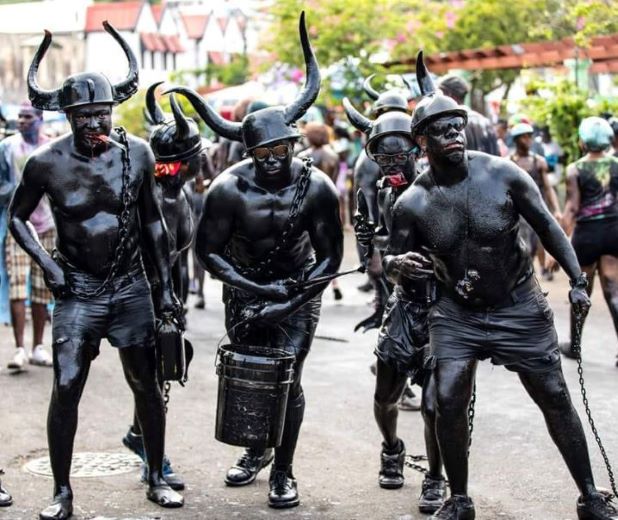Learn About Grenada’s Jab Jab with Glenn Forsyth–The King of Jab
by Lou-Ann Jordan Jan 31, 2024

Against a navy sky, trees are elongated eerily by their shadows. The soft yellow light of intermittent electricity poles holds the shrouding darkness at bay. It’s J’ouvert morning!
It’s that highly anticipated moment when the black, glistening bodies of the Jab Jab masqueraders swarm the streets. Reddened tongues slithering out of horned heads, and faces contorted they chant in frightening abandonment to the sounds of the drum. Dragging chains that are symbolic of those that once bound our ancestors, the masqueraders are terrifying and carefree in their portrayal.
Many islands uphold the practice of Jab Jab during the carnival festival. So much so that on Carnival Monday scores of blue-coloured or mud-covered bodies fill the streets. However, Jab Jab in Grenada is quite distinctive. So, with Kayak Mas having recently passed and Spicemas 2024 approaching in August, we thought it would be fun to feature one of Grenada’s foremost Jab masqueraders, Glenn Forsyth.
A notable and possibly the most recognisable figure in the arena, Glenn has played Jab Jab for some 28 years. Read on as Glenn shares his experiences, his thoughts on Jab, and tips on transforming into a fearsome Jab.
How did you first get involved, and what was that experience like?
My first interaction with Jab Jab was during my childhood days. I would go with my parents to J’ouvert, and we would meet the Jab Jab bands on the road. They used to partially block the way and ‘tax’ patrons to pass; the monetary contributions they collected went toward the mas.
I remember being scared of the black mas, mainly because it was before daylight broke. Over time, the fear turned into curiosity and interest. My village and some of the surrounding ones were renowned for serious jab portrayals. My interest intensified when I was exposed to the pre-carnival preparations of drumming and composing chants and songs. The songs were usually about people in the village.
When I finally got the opportunity to play, it was pure anticipation and excitement in the weeks of preparation leading up to the actual day. We walked from Perdmontemps, St. David to St. George on the big day, and I didn’t even notice the distance. I was so excited.
Once in the capital, on Market Hill, all the villagers converged and completed covering their skin, making it black and shiny. We got our ‘beast’ or props out. Some had serpents, the brave ones, around their necks or in their hands, and we were ready to descend on onlookers. We circled the town several times, even running through other bands. We were wild, terrifying, and free—it was priceless!
That short but memorable experience of us descending from atop Market Hill; a mass of other black-bodied revellers singing, chanting, drumming, blowing conch shells, spitting fire, and some, skating down that slippery oil-covered pavement is etched in my memory.
What does Jab Jab mean to you?
Overall, mas is a form of expression, but Jab Jab is unique in the way it expresses freedom. It reflects the absence of inhibitions or restrictions.
It has become a part of me, and it is very satisfying to know that I am involved in a part of our culture that is admired and loved by so many people locally and abroad. I would like to think I’m a true ambassador of the island.
What is something significant about the Jab Jab that people may not know?
Most of us know that it originated during the slavery period. Yet, many may not know that molasses was what was first used to paint the skin.
Is your Jab Jab portrayal strictly for J’ouvert morning? In what other events do you usually participate?
No, in recent years, we have participated in activities outside of the carnival season. We perform at Halloween presentations, cultural presentations for regional conferences, and social gatherings during the Easter season. Of course, we’re also at the many pre-carnival activities and concerts.
When you hit the streets, what lasting impression do you want people to have of your portrayal?
I always aim to stand out as the “really black” Jab. I also want onlookers to be awed and even a bit terrified. In uniformity, our group moves through the streets in our headwear adorned with horns, chanting and dragging chains. It’s always nice to get an audible “aww” from spectators.
For pretty mas, there is a narrative behind the costume. Do Jab Jab masqueraders base their portrayals on a current event or story?
Over the years, we’ve worked hard to maintain the origin of the mas, though some aspects have changed. Despite this, we still work with a narrative for our portrayals, and the theme is adjusted each year.

There has been much debate about the substance used to darken the skin. Which do you prefer, oil, paint or charcoal, and why?
My first choice has always been a “good black” oil because it gives the desired gloss and remains moist on the skin. Also, once the proper procedure is used, it’s easy to remove.
The paint is usually not as thick and black and dries out quickly because it’s water-based. Also, as the paint cracks, it leaves the skin dry.
The use of charcoal isn’t new, but it’s becoming more popular now because of environmental concerns with oil. Also, some people’s skin sensitivity is a deterrent to using the oil, so they lean more towards using charcoal.
I’ve witnessed significant progress in the last few years with refining the charcoal base product, and I’ve used it successfully in several appearances.
In your opinion, what makes Grenada’s Jab Jab unique?
Grenada’s Jab Jab is unlike any other, mainly because it is a significant part of our Carnival celebrations; its influence on our culture is unprecedented. As far as I am aware, we’re the only island where this form of masquerade is displayed in such large numbers. On J’ouvert morning, the city is black.
Jab Jab has been deeply rooted in our society for many years, and the continued high level of interest it receives speaks well for its future.
What aspect of the tradition has changed over the years?
There have been a few changes over the years. The most recent would be the use of charcoal as an alternative to oil. In years gone by, serpents were incorporated, but that no longer takes place.
Also, traditionally, there were more chants, jab spelling, singing and drums during the parades. Instead of percussion instrumentals, stereo music played by DJs currently dominates. However, we are making efforts to revert to the original style.
How are the Jab Jab masqueraders organised during the parade?
We may join the parade as individual bands or in several small groups. The small groups are primarily villagers who come together at one central point and form one or two huge bands that take over the streets on J’ouvert morning.
How can they connect with a Jab Jab group for someone visiting Grenada and interested in playing Jab Jab?
The major bands are usually registered with the Spicemas Corporation, and so Spicemas can be contacted for information. Additionally, many groups maintain a social media presence, so anyone interested can visit them on their social sites.
Want to transform into a Jab? Here’s what to do in three quick steps:
For men – Don a pair of shorts and leaving upper body bare.
For women – Get dressed in a pair of shorts and a t-shirt.
- Cover your body with a greasy substance. A few suggestions: petroleum jelly, baby oil, shortening or cooking oil.
- Apply a black substance—oil, charcoal or body paint.
- Grab your horn.
Clean-up is easy. Use a cloth to remove the black covering from your skin. Once completed, proceed to the shower. Using soap, work up a thick lather and clean skin thoroughly. Rinse and repeat as necessary.
Yello thanks Glenn Forsyth for his insightful contributions.








